Prose by Dr. Conjeevaram Natarajan Annadurai - Prose: The Convocation Address | 11th English : UNIT 5 : Prose: The Convocation Address
Chapter: 11th English : UNIT 5 : Prose: The Convocation Address
Prose: The Convocation Address
Prose
Convocation Address
Read an excerpt from the famous
address made by the great leader Arignar Anna, at the Annamalai University,
Tamil Nadu, on November 18, 1967, on the occasion of Convocation.
Thankful as I am for the unique honour conferred on me by this institution. I stand before this august
assembly today to deliver the Convocation address, for though it is a pleasure
to be present on the happy occasion of greeting the graduates of the year and
wishing them all a bright and prosperous future, it is not an easy task to
place appropriate guidelines before them.
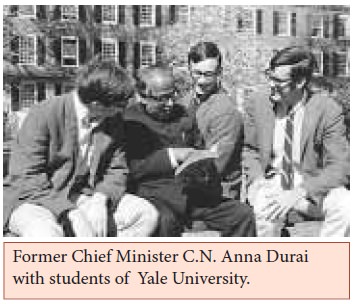
The fact that I am conscious of my own limitations gives me a
sense of relief, for I shall not attempt to offer original ideas or theories
with a special stamp, but only reiterate
some of the cardinal principles enunciated
by those who offered their advice in past years, perhaps with annotations here
and there, bringing to bear the lay-man’s point of view to the findings of experts
in various fields connected with education.
This is the age of the common man –
whatever the regrets some might have – and it is his point of view that matters most and I do claim to represent him in all his ruggedness.
Systems and schools of thought, whether it is in philosophy or
politics, ethics or economics, are certainly meant for him. Universities, as
the repositories of knowledge and
the nursing ground for the emissaries
of thought, wisdom and service, have got a prominent role to play and the
prominence is growing every day, as more and more individuals get themselves
equipped for the task of bettering society in all its age when we have eschewed monarchy and
autocracy and have inaugurated the
era of democracy.
During the monarchical or feudal days, Universities
had to train scholars and poets to adorn the chambers of royalty or the gilded
mansions of lords and nobles and their wisdom was meant for the mansion, not
for the market place. Those were days when numbers did not count, nor were
eminent scholars asked to face the problems confronting the masses. They were
content to work in secluded spheres, far from the din and noise of the common man and weave the costly fabric of
philosophy of poetry which in turn was to be converted into dazzling garments
for the select and the privileged.
The role of the University today is not cloistered and confined as in the past. Its function has
been enlarged_not in its fundamentals but in its domain. It has to
take into account the commonness, but trim and train, guide and lead him,
before being asked to do his duty as the citizen of a democracy – a task which
kindles sweet hopes but which demands patience and perseverance, faith and
confidence, faith in himself and in
others and confidence in his inherent ability to shoulder
the responsibilities. The common man has become the origin of a potential ruler
and the duty today, the responsibility today of the universities is to fashion
out of him an individual fitted and equipped for the task of making democracy
fruitful and effective.
For better understanding:
How can a University
trim and train, guide and lead a person to function better in society?
While addressing the University of
Brussels, Dr. S. Radhakrishnan, our former President, made the following
statement: “For its proper functioning democracy requires more qualities than
other forms of government. It is in the universities that we can develop the
true spirit of democracy, appreciation of others’ points of view and adjustment
of differences through discussions. It can be kept healthy and strong by the
exercise of individual responsibility and judgement. In universities we have to
recall the struggles of the past and realize the perils and possibilities, the
challenges and opportunities, of the present.”
For
better understanding:
According to Dr. S. Radhakrishnan Universities ensure the
democratic way of life for the future generations. How?
Graduates of the year, I wish you
all a prosperous future – for, after all, the immediate concern of every
individual, graduate or no graduate, is to acquire the means for a decent
living. That is the first motivation for all human activity and no one can
ignore it, but that ought not to be the sole objective. Something higher and
nobler than mere individual material advancement is expected of you – for
remember that this University education is a privilege that you enjoy, for
which you are deeply indebted
to the community of which you are a member.
Most of the money needed for maintaining institutions of higher
education come from the revenues collected from the community through the
State, and a good proportion of that revenue comes from the tillers and the toilers, men who did not
enjoy this privilege, men who
willingly submit themselves to discomfort, so that they can enable the next
generation to lead a better life. Graduates, may I ask you, how are you going
to repay – what is to be your contribution to the social chest on which you
have drawn so largely. Unless you replenish it richly, coming
generations will find only an
empty coffer.
For better
understanding:
List the contributions of the educated youth to the society.
Your superior education increases your responsibility to society
and therefore, apart from or along with your own individual advancement,
society has got a right to expect an adequate return from you – not so much in
terms of money as in terms of service – in toning up society, in bringing light
into the dark alleys, sunshine into dingy places, solace into the afflicted,
hope unto the despondent and a new life unto
every one.
Unless service is the outcome, the sermons become sweet nothings.
As Jefferson stated, “We
must dream of an aristocracy of achievements arising out of a democracy of
opportunities.”
And when I seek your help and cooperation in the supreme task of
serving society, please do not wink and smile and say, it is all so easy to
say. I am not unaware of the difficulties in the way, nor am I going to brush
aside the influence of the environment on you. Maybe, the world in which you
are to begin the journey is one which will dim your hope, disturb your
determination. You may come face to face with the unpleasant sight of practices
widely differing from the principles inculcated in you. You may find
self-seekers enthroned and the patient worker decried. Tyranny of all sorts may
stare at you and every step you take will be a struggle. I admit that the
environment is such that even people with robust optimism will be discouraged
and forced to take to the path of ease and comfort.
But, we should also realize that a continuous stream of men and
women endowed with the spirit of
service have been carrying on the crusade successfully and have conferred rich benefits
on humanity.
We, the Tamilians, have been holding aloft this ideal for more
than two thousand years as expressed in Purananuru (182).
As inheritors of that rich legacy,
you are best suited to overcome even the environment and serve society to the
best of your abilities.
I am confident that you are being sent into the wide world. With
this objective – you are bound to win, for you are adequately equipped with the
spirit supplied by this great institution. May your life be a bright one, and
may its lustre brighten the entire land! Accept my congratulations and march
onwards, towards the land of smiles.
About the Author
Dr. Conjeevaram
Natarajan Annadurai (15 September 1909 – 3 February 1969), popularly called Arignar Anna was an Indian
politician who served as the Chief
Minister of Tamil Nadu (1967 – 69). He was a great orator and an acclaimed
writer in Tamil. Jawaharlal Nehru hailed him as one of the greatest
parliamentarians. He has published several novels, short stories and plays
which incorporate political and social themes. C.N. Annadurai was awarded the
Chubb Fellowship at Yale University, the first non-American to receive this
honour. The same year he was awarded an honorary doctorate from Annamalai
University.
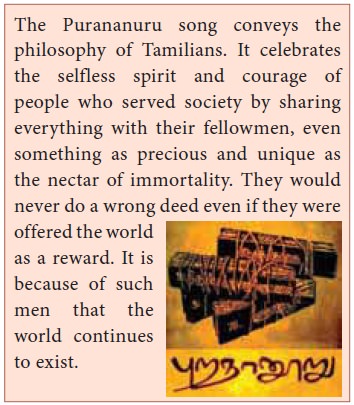
A. Work in pairs. Look at the mind map below and add a few other features of democracy you can think of. Share your answers with the class.
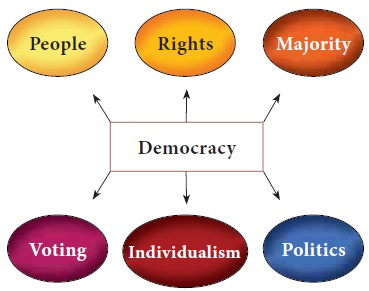
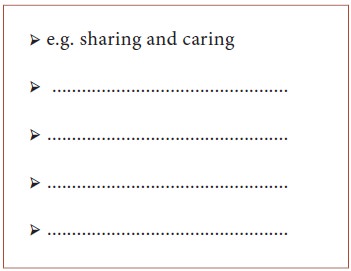
B. Given below is a list of items or features you find in a good school. Study the list and classify the items as individual and common.
textbooks – uniform – smart classroom – laboratory – competent teachers – library – mid-day meals – blackboard – stationery – playground – sports equipment-washrooms
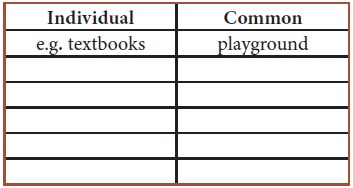
C. Who provides these common facilities? Tick the appropriate source.
· Parents
· Educational institutions
· The Department of Education
· Social Service Organizations
· Other agencies
The common facilities you enjoy such as the playground, classroom etc. help you achieve your academic, vocational or any other goal in life. They are the facilities created for students’ welfare by society.
D. Discuss this aspect with your partner and share your views on how students can give back to society.
E. Introduction
What goes around comes around!
Every activity in a society, be it development of infrastructure, education, health care etc. demands resources of all kinds. Resources can be mobilized only through human efforts. This effort comes from many different sections of society. Thus, the fruits of development we enjoy today have come about only through the hardwork of many unsung heroes.
It is our duty to contribute to development by giving back what we have taken. When a qualified student embarks on his/her career, an element of service should always be a part of motivation. The society has cradled and nurtured every graduate to bloom and spread his/her wings. Graduation is the apt time to give back to society the gains we have obtained.
Related Topics